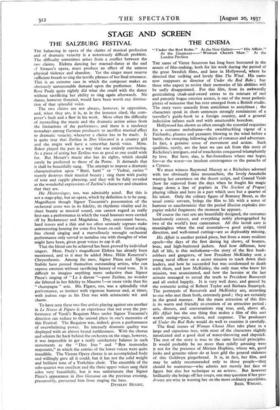STAGE AND SCREEN
THE SALZBURG FESTIVAL
THE balancing in opera of the claims of musical perfection and of dramatic veracity is a notoriously difficult problem.
The difficulty sometimes arises from a conflict between the two claims. Elektra dancing her maenad-dance at the end of Strauss's opera, must produce an effect of the utmost physical violence and abandon. Yet the singer must reserve sufficient breath to sing the terrific phrases of her final utterance. This is an extreme case in which the composer makes an obviously unreasonable demand upon the performer. Mme. Rose Pauly quite rightly did what she could with the dance without sacrificing her ability to sing again afterwards. No dance, however frenzied, would have been worth any diminu- tion of that splendid voice.
The two claims are not always, however, in opposition, and, when they are, it is, as in the instance cited, the com- poser's fault and a flaw in his work. More often the difficulty of reconciling the music and the dramatic action arises from the limitations of the performers, and there is a tendency nowadays among German producers to sacrifice musical effect to dramatic veracity, whenever a choice has to be made. It is quite true that Zerlina in Don Giovanni is a country girl and she might well have a somewhat harsh voice. Mine. Bokor played the part in a way that was entirely convincing. As a piece of acting her Zerlina was as good as one could wish for. But Mozart's music also has its rights, which should surely be preferred to those of da Ponte. It demands that it shall be beautifully sung. The attempt to impose a dramatic characterisation upon " Batti, batti " or " Vedrai, carino " merely destroys their musical beauty ; sing them with purity of tone and supple phrasing, and they will be fully revealed as the wonderful expressions of Zerlina's character and situation that they are.
Die Meistersinger, too, was admirably acted. But this is not a stage-play, but an opera, which by definition is to be sung. Magnificent though Signor Toscanini's presentation of' the orchestral score was in its fidelity, its rhythmic vitality and its sheer beauty as musical sound, one cannot regard as really first-rate a performance in which the vocal honours were carried off by Beckmesser and Magdalena. Dry, unresonant basses, hard tenors and a thin and too often unsteady soprano make uninteresting hearing for some five hours on end. Good acting, fine choral singing and a marvellously wrought orchestral performance only served to tantalise one with thoughts of what might have been, given great voices to cap it all.
That the blend can be achieved has been proved by individual singers. Mme. Pauly's magnificent Elektra has already been mentioned, and to it may be added Mme. Hilde Konetzni's Chrysothemis. Among the men, Signor Pinza and Signor Stabile have proved themselves outstanding artists, who can express emotion without sacrificing beauty of vocal tone. It is difficult to imagine anything more seductive than Signor Pinza's singing of " La a darem "—poor Zerlina, no wonder she faltered in her fidelity to Masetto !—or more virile than his " champagne " aria. His Figaro, too, was a splendidly vital performance, as instinct with vigorous humour and, at times, with jealous rage as his Don was with aristocratic wit and charm.
To have seen these two fine artists playing against one another in Le Nozze di Figaro is an experience that not even the per- formance of Verdi's Requiem Mass under Signor Toscanini's direction can reduce to the second place in one's memories of this Festival. The Requiem was, indeed, given a performance of overwhelming power. Its intensely dramatic quality was displayed with an almost brutal ruthlessness. With the chorus and soloists far back behind the orchestra on the stage, however, it was impossible to get a really satisfactory balance in such movements as the " Dies Irae " and " Rex tremendae majestatis," in which the entries of the lower voices were quite inaudible. The Vienna Opera chorus is an accomplished body and willingly gave all it could, but it has not the solid weight and brilliant tone of a Yorkshire choir. The ensemble of the solo-quartet was excellent and the three upper voices sang their solos very beautifully, but it was unfortunate that Signor Pinza's appearance in Don Giovanni on the previous evening, presumably, prevented him from singing the bass.
DYNELEY HUSSEY.






































 Previous page
Previous page